On Wednesday the European Union announced that it will impose higher tariffs for electric vehicles imported from China The EU conducted an investigation and concluded that Chinese EVs are a major beneficiary of unfair government subsidies This creates an unlevel playing field According to the EU these subsidies not only distorts the market but also pose a significant risk to European EV producers threatening economic damages to local industries This is part of an EU wide effort to protect its green energy sector and promote fair competition
The BEV value chain in China: A preliminary assessment

The European Commission which is the executive branch of the EU concluded in a preliminary analysis that the value chain for China battery electric vehicle (BEV) benefits unfairly from subsidization The Commission then declared that it was necessary to impose provisional anti dumping duties on BEV imported from China This bold move demonstrates the EU determination to protect its automotive industry against the disruption caused by artificially supported foreign rivals The EU is targeting these imports to protect its electric vehicle market and ensure fair trade
Background to the Tariff Investigation

These new tariffs are the result of an EU investigation launched in October that targeted China electric car sector The duties are provisional at the moment but will take effect July 4 if negotiations between Chinese authorities do not yield a satisfactory result If the talks fail to produce any results the EU intends to take definitive action within four months after imposing provisional duties This strategic move demonstrates the EU determination to protect its industries against unfair competition while still allowing for diplomatic efforts to correct the trade imbalance
The threat is urgent and must be addressed
The European Commission said that the surge in subsidized Chinese products at artificially low price poses an imminent clear threat of harm to EU domestic industry The influx of Chinese imports which are heavily subsidised could undermine the competitiveness and stability of European manufacturers The warning from the Commission highlights the need to address this issue as artificially deflated Chinese electric vehicle prices could cause lasting damage to the EU automobile sector if not addressed
EU Commitment to Evidence-Based Actions
Valdis Dombrovskis (EU Trade Commissioner) stressed in an interview on CNBC Wednesday that the investigation of Chinese EV subsidies is based on facts and evidence He also noted that discussions were underway with Chinese authorities and other key stakeholders in the hope of finding solutions that would be acceptable to both parties Dombrovskis comments highlight the EU balance in addressing trade concerns while seeking diplomatic solutions to protect European industries
China response to EU decision

A spokesperson from China Ministry of Commerce criticised the EU move on Tuesday calling it protectionist and saying it was lacking a solid legal and factual foundation Google translated the remarks of the spokesperson who expressed his strong disapproval He argued that the EU action unfairly targeted Chinese electric vehicle imports, and disrupted the principles free trade China statement is a strong response to the EU proposed trade tariffs It signals growing tensions between the two sides as they navigate the complex world of international commerce and market competition
China’s Defense Against the EU Ruling
China Ministry of Commerce reacted with a sharp response saying that the findings revealed in the EU ruling are lacking in factual and legal foundation It argued that EU had overlooked that China competitive advantage in the electric vehicles sector is derived from open market competition rather than unfair practices The ministry also accused the EU for not adhering to international trade regulations established by the World Trade Organization This sharp criticism highlights Chinab rejection for the EU reasoning behind the tariffs and its defense of China EV sector as a legitimate competitor in the global market
Increased tensions in the trade war

The spokesperson of China Ministry of Commerce strongly condemned the EU actions He stated This is an egregious protectionist move which escalates trade tensions in the name of’maintaining a fair competition but destroys it in reality The spokesperson also argued that EU decision threatens to disrupt the global automotive supply chains including those within the EU China strong rhetoric is a reflection of its deep concern over the wider implications of EU tariffs on international markets
EU Tariff Structure:
The European Union has decided that it will impose a 38.1% steep tariff on Chinese battery electric vehicles producers who did not cooperate in its investigation This is a clear signal of enforcement Manufacturers who cooperated but were not sampled however will be subject to a 21% duty reduction The EU has adopted a two-tiered approach to promote transparency and collaboration while protecting its domestic market against what it believes is unfairly subsidised competition The measures are designed to level the playing field between European automakers and non compliant Chinese manufacturers
Tariffs Individualized for Cooperation

The European Commission has also released a list of individual tariffs that according to Valdis Dombrovskis of the Trade Commission are directly linked to the degree of transparency and cooperation shown by the companies during the investigation Dombrovskis said that companies who actively participated in the investigation and provided detailed information were subject to lower rates of tariffs which reflected their willingness to collaborate This nuanced strategy underscores the EU commitment to fairness while sending a strong message that transparency will be rewarded It also aims to ensure compliance by manufacturers as the bloc takes an aggressive stance on trade practices
Major Chinese EV Manufacturers
BYD the leading Chinese manufacturer of battery electric vehicles (BEVs) has been imposed a tariff of 17.4% Geely is subject to a duty rate 20% The EU also imposed a maximum tariff of 38.1% against SAIC a Chinese automotive company The EU’s ongoing investigation included all three companies illustrating its scrutiny of major players on the Chinese EV Market The EU is determined to combat what it views as unfair trade practices while also navigating the complexity of international competition within the rapidly changing electric vehicle landscape
Tesla’s Individual Duty rate Consideration

Elon Musk whose Tesla operates a gigafactory near Shanghai could be eligible for a custom calculated duty rate if it makes a substantiated demand according to the European Commission In an interview with CNBC Trade Commissioner Valdisdombrovskis explained that Tesla actively advocates for lower tariffs The commission is currently evaluating this request This possible consideration for Tesla highlights the EU willingness and ability to work with key players in the industry as well as to assess each individual circumstance
Tesla Subsidies: An Assessment
He said We can dig deeper into Tesla specific circumstances and subsidies it received in China which could result in different levels of countervailing duty This analysis highlights the EU commitment towards a nuanced and thorough evaluation of each case to ensure that tariff decisions reflect the complexity of the global automotive industry The EU goal is to create a more fair trade environment by taking Tesla unique position into consideration while also balancing regulatory objectives and the realities of global competition
Nio response to increased tariffs

Nio unwavering commitment to the electric car market was reaffirmed in response to EU announcement The company expressed its strong opposition to increased tariffs It argued that such measures were a tactic used to impede normal global EV trade Nio said that this approach not only hinders but also undermines efforts towards global environmental protection and emission reduction Their comments reflect a broader concern about trade barriers that could stifle cooperation in the EV industry ultimately jeopardizing progress towards a greener tomorrow
EU Member States Deliberate for Months
This announcement comes after months of intense debate among EU member countries about the possibility of raising tariffs The debates during this period reflect the complexity and divisions in the EU as member states weighed the impact of a tariff increase on their own industries and trade relationships This decision highlights the EU proactive approach to addressing imbalances in the global marketplace
Divergent perspectives on tariff increases
France has emerged as one of the strongest advocates for higher tariffs It argues that Europe needs to protect itself from Chinese production practices and significant subsidies Germany on the other hand has expressed concern about this decision and warned that it could spark a wider trade conflict The divergence of perspectives illustrates the different priorities in the EU as the member states struggle with fair competition and need for strategic protection in an increasingly competitive world
China’s Retaliation: Risks

German automotive executives are concerned about the risks to European automakers especially if China decides retaliate Their worries reflect an increasing concern that trade tensions may have significant repercussions on the industry and threaten market access and supply chain This cautious stance highlights the delicate balance that the EU must maintain between protecting its own interests and maintaining robust trading relationships in an interconnected global economic system
Tensions between the EU and China on trade are increasing
Since months tensions in trade between the EU and China are increasing This is especially true when it comes to electric vehicles (EVs) The EU’s investigation of the subsidies given to Chinese EV producers by the government is at the heart of this dispute along with serious accusations that Beijing dumps excess vehicles on the global market This contentious environment reflects wider concerns about fairness in competition and market dynamics as both parties navigate international trade and try to protect their respective automotive industries
China’s Position on EU Trade Practices

The EU claims that these practices are a serious threat to the electric vehicle industry in its region and could even lead to local automakers being forced out of business China in response has denied all wrongdoing and maintained that its actions were legal and compliant with the international trade standards This clash of viewpoints highlights the increasing tensions between the two sides as they grapple with their trade policies and the urgent necessity to create a competitive and balanced market for electric cars
U.S. alignment with EU on trade issues
In May the U.S. implemented tariffs on a variety of products including electric cars imported from China The U.S. tariffs on imported EVs will increase dramatically in the coming months going from 25% to a staggering 100% This shift in policy is a sign of a concerted attempt by the U.S. as well as the EU to combat perceived unfair trade practices and protect domestic industries on the highly competitive electric vehicle market
China’s rapid growth in the EV market

China market for electric vehicles has seen a remarkable increase Leading manufacturers such as BYD are fiercely competing with established giants like Tesla to gain market dominance n Chinese companies are also strategically expanding their market share in Western countries positioning themselves as cheaper alternatives to local automakers This aggressive push highlights not only the competitive landscape in the EV sector but also reflects a broader globalization trend as Chinese manufacturers strive to gain a foothold on international markets amid rising demand for electrical mobility
Frequently Ask Question
How innovative is China in the electric vehicle and battery industries?
According to one assessment Chinese EV manufacturers are 30% faster at developing and releasing new models than the legacy American European and Japanese automakers
How will China fast growing EV sector impact the automobile industry?
The EV sector is expected to grow substantially with projections showing an increasing share in the automobile industry Morgan Stanley predicts that EVs are expected to account for around 26% of all global car sales in 2030 This will rise to 72.2% in 2040 and then around 81.5% in 2050
What is Chinan EV goals?
Recent reports indicate that they could be closer to their goal than previously thought Part of the plan is to have 40% of the cars on the roads by that time be new electric vehicles
Why is China leading in the EV market?
government incentives such as tax breaks procurement contracts and other policy incentives have led to the emergence of a number of Chinese made EV brands that continue to improve on new technologies in order to meet the needs of Chinese consumers In turn this has created a large number of young car purchasers

